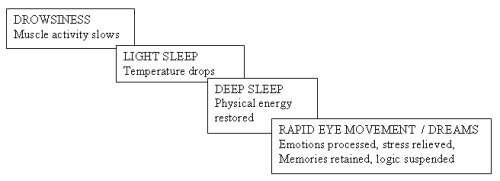Sleeping problems
About homeopathy
Homeopathy is a way of looking at individual people - of understanding their stresses and strains in life and how they react to them.
Homeopathy recognises symptoms of ill health as an expressions of a central disturbance in the individual person, and treatment is for the person, not the disease.
By a "central disturbance", we mean a functional disturbance of the central controlling systems of the body; the psyche, the nervous system, the hormone system and the immune system.
Homeopathic remedies work by stimulating the body's own healing mechanisms.
The quality of your sleep is often a good general indicator of how you are. How you feel, think and function can have a big impact on how you sleep - so poor sleep, or lack of it can be symptomatic of some disturbance in one or all of those things.
Conversely, how well you sleep can clearly have a big impact on how you feel, think and function ... a vicious circle.
The aim of homeopathy is to help us to step outside of this vicious circle.
Sleep
Why we need it:
- Memories are organised and recovered, learning is consolidated
- The parts of the brain controlling emotions, decision making and social interaction slow down to optimise their performance when awake
- Some experts suggest that neurons repair themselves, optimising function of the nervous system
- The immune system is strengthened
- Growth hormones are released to allow physical and mental development
What happens when we sleep:
- Consciousness of the world is interrupted
- Response to stimulation, such as sounds and touch is reduced
- Skeletal muscle movement is reduced
- Metabolism slows down
- Brain wave patterns are complex and active
It is a process of physical and mental refreshment - resting the body and re-organising the mind.

During the night, we typically go up and down this "staircase" many times and wake several times for periods of 1-2 minutes without remembering.
So, what happens without it:
- Memories and thoughts are confused, jumbled
- Emotions are not processed
- Decision making and social interaction becomes difficult
- The immune system is weakened
- The body becomes physically tired
- Hormone production is disturbed
How much do we need?
We are all different. People vary greatly in their need for sleep. They can range from needing 4 to 10 hours sleep a night. A newborn baby can sleep for 17 hours a day, whereas many people in their 70s require less than 6 hours sleep.
As a general rule, if you wake up feeling refreshed, and you don't feel sleepy during the day, you are getting enough sleep.
Insomnia
Nearly everyone has problems sleeping at some time. These could be in getting to sleep, long periods of wakefulness during the night or too early in the morning, and consequently being unable to function properly during the day.
Common causes include:
- An underlying physical condition such as pain, coughing, itching, digestive disorders, menopausal hot flushes
- Disruptions in environment or routine
- Emotional issues such as stress, relationship difficulties, anticipation, bereavement
- Depression or anxiety
- Side effects of medicines, alcohol, caffeine or nicotine
General tips for better sleep - "hygiene" factors
- Reduce caffeine, avoid alcohol, nicotine and heavy meals for several hours before bed
- Exercise earlier in the day, but not within a few hours of bedtime
- Maintain a routine of daytime wakefulness - avoid sleeping in the day, get up at the same time every day
- Ensure the bedroom is quiet and relaxing - not too hot, cold or noisy
- Have a "winding down" bedtime routine - a bath, a warm drink, soft music, nothing mentally demanding
- If you cannot sleep after 20-30 minutes, get up rather than brood in bed
Conventional treatment
The main treatment for insomnia is "Cognitive Behavioural Therapy" (CBT), to help you identify and unhelpful or persistent thoughts which prevent you sleeping, and to change your thoughts or behaviour to avoid them.
Sleeping tablets are usually considered a last resort, but may be prescribed for a short period. They can create problems such as confusion, clumsiness, daytime drowsiness, addiction and a need for higher doses over time as your body becomes used to them.
Homeopathic treatment
We are all different. No two individuals will experience insomnia in the same way.
Your insomnia picture is like a jigsaw. You have all the pieces and the purpose of the homeopathy consultation is to connect them, to understand how they fit together.
For example, I would like us to explore :
- How and when did it start?
- What are your symptoms?
- Which of these are a result of lack of sleep, and which are a cause of lack of sleep?
- How does it affect you day to day - physically, mentally, emotionally - is there any pattern?
- Is there anything that makes your sleep better or worse?
- How is your health generally - including your history and any recurring issues?
The remedy prescribed will be capable of producing a similar symptom picture (in homeopathy, we are treating like with like) - a good remedy will stimulate your body's own defence mechanisms into resolving any central disturbance which, in turn and in time, will have a positive impact on the symptoms, including insomnia.
Sleep and insomnia - useful websites
Northumberland, Tyne and Wear NHS Trust, Sleep Problems, A Self Help Guide
Written by clinical psychologists and explaining a Cognitive Behaviour Therapy model of self help
NHS Direct Health Encyclopaedia - Insomnia
Looks at symptoms, causes, diagnosis, prevention and treatment
